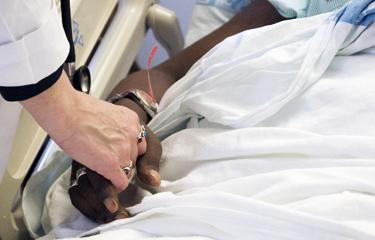

Racism and patient-clinician communication
Background
For patients with serious illnesses or receiving end of life care, good patient-clinician communication and mutually-trusting medical decision-making improves health outcomes, the quality of a patient’s end of life care and their satisfaction with their treatment plan.
However, studies have documented racial inequities in serious illness and end of life care for Black patients as well as the biases and microaggressions Black patients have experienced.
Dr. Crystal Brown, assistant professor (Pulmonary, Critical Care and Sleep Medicine) and colleagues recently sought to understand how these phenomena might intertwine.
How might patients’ previous experiences with racism in healthcare influence patient-clinician communication and decision-making and ultimately impact health outcomes?
Understanding the connection
Brown and team conducted semi structured interviews with 25 hospitalized Black patients with serious illness. In seeking to understand the impacts of specific experiences, consenting participants were selected purposefully based on indicating they had experienced discrimination in a medical setting.
In their interviews, participants reported high levels of race-based medical mistrust and frequent experiences with discrimination and microaggressions from healthcare workers. Three broad themes were identified from the interviews: 1) experiences with racism, 2) epistemic injustice and mistrust, and 3) poor communication and mistreatment- and trauma-informed decision-making.
The research team learned not only that these forms of bias and mistreatment exist, but that they shape future communications and interactions as well. Participants' current attitudes, beliefs and behaviors were shaped through navigating a medical landscape that was often unjust and marginalizing.
“Our study findings framed personal attitudes, beliefs, and behaviors not as deficits, but as responses to everyday bias, discrimination, and other forms of racism,” wrote the authors.
Building equitable interventions
“I hope this work helps healthcare workers understand that it’s the everyday, seemingly mundane, interactions between patients and their care teams that reinforce and exacerbates racism experiences in clinical settings,” Brown said.
Perspectives from the study illuminate that a patient’s cumulative experience contribute to their communication and decision-making during serious illness. Race-conscious interventions that take this life-history into account may be needed to effectively address palliative care and other health inequities.
“This makes it even more important to not just acknowledge that factors such as implicit bias, for example, are present within healthcare settings,” Brown said, “it’s important to understand that we as individuals harbor these biases that make themselves evident when we care for our patients.”
“It’s even more important to figure out ways to pragmatically counteract these biases.”